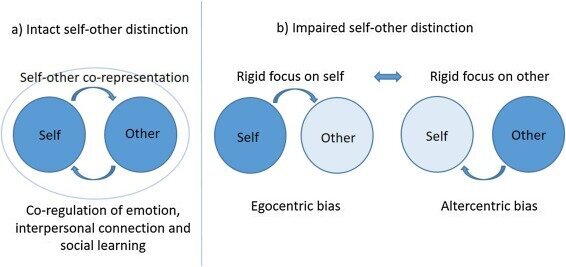David Baxter PhD
Late Founder
The Role Of Mentalization In The Development Of Borderline Personality Disorder
by Simone Hoermann, Ph.D.
Jul 30th 2010
Continuing on the topic of attachment and Personality Disorders, a paper by Fonagy and Bateman published in the Journal of Personality Disorders in 2008 recently caught my eye. As mentioned previously, to date, we still don?t quite know what causes Personality Disorders. On several occasions, I have mentioned the fact that a large number of people with Borderline Personality Disorder (BPD) have experienced childhood abuse or trauma, but that not everyone who had these adverse experiences necessarily develops BPD. In an attempt to formulate a model of how Borderline Personality Disorder develops, Fonagy and Bateman use attachment theory and the concept of mentalization in order to bring together insights from biological as well as psychological research on the topic.
The main idea posited by Fonagy and Bateman is that people with BPD have weaknesses in their ability to mentalize, that is, to understand their own and others? internal states and motivation. This capacity to mentalize, according to the authors, develops within the context of early attachment relationships. Fonagy and Bateman emphasize that any successful treatment of BPD has to stimulate the capacity to mentalize in one form or another.
The disruption of the development of mentalizing capacity is viewed by Fonagy and Bateman as a key factor in the development of BPD. The main reasons for this kind of disruption are typically trauma, abuse, or neglect. We know that a large number of people with BPD have experienced abuse or neglect in childhood. However, not everyone who had these experiences necessarily develops BPD. Therefore, a history of trauma, abuse, or neglect is not viewed as sufficient for the development of BPD. It is generally assumed that certain genetic and temperamental predispositions can mediate the development of BPD.
What is emphasized by Fonagy and Bateman, though, is that there is research evidence that the parent?s response to trauma and abuse likely play a more important role than the abuse itself. In other words, if parents respond in a way that is invalidating and non-supportive, the effect of trauma will likely be potentiated. Thus, a nurturing family environment that encourages processing and discussion of mental states is crucial to the development of healthy personalities. If early caregivers are consistently invalidating of the infant, if they undermine the child?s self-perception and self-reflection, the child will have a harder time recognizing and identifying their own internal (emotional) states. This inability to identify one?s feelings and motivations obviously impacts the ability to regulate one?s emotions ? a key difficulty for people with BPD. In turn, parental under-involvement is also viewed as a key factor that inhibits the development of the ability to understand other people?s internal states ? in other words, the development of social cognition.
Fonagy and Bateman assume that there are inborn dispositions that make individuals vulnerable to developing BPD. If these vulnerabilities meet inadequate parental behavior and disorganized attachment and trauma, this will undermine the ability to mentalize and thus cause Borderline Personality Disorder.
Simone Hoermann, Ph.D., is a Psychologist in private practice in New York City. She specializes in providing psychotherapy for Personality Disorders, Anxiety, and Depression. She is a faculty member of Columbia University, and facilitates psychotherapy and skills training groups at the Columbia East 60th Street Day Treatment Program.
by Simone Hoermann, Ph.D.
Jul 30th 2010
Continuing on the topic of attachment and Personality Disorders, a paper by Fonagy and Bateman published in the Journal of Personality Disorders in 2008 recently caught my eye. As mentioned previously, to date, we still don?t quite know what causes Personality Disorders. On several occasions, I have mentioned the fact that a large number of people with Borderline Personality Disorder (BPD) have experienced childhood abuse or trauma, but that not everyone who had these adverse experiences necessarily develops BPD. In an attempt to formulate a model of how Borderline Personality Disorder develops, Fonagy and Bateman use attachment theory and the concept of mentalization in order to bring together insights from biological as well as psychological research on the topic.
The main idea posited by Fonagy and Bateman is that people with BPD have weaknesses in their ability to mentalize, that is, to understand their own and others? internal states and motivation. This capacity to mentalize, according to the authors, develops within the context of early attachment relationships. Fonagy and Bateman emphasize that any successful treatment of BPD has to stimulate the capacity to mentalize in one form or another.
The disruption of the development of mentalizing capacity is viewed by Fonagy and Bateman as a key factor in the development of BPD. The main reasons for this kind of disruption are typically trauma, abuse, or neglect. We know that a large number of people with BPD have experienced abuse or neglect in childhood. However, not everyone who had these experiences necessarily develops BPD. Therefore, a history of trauma, abuse, or neglect is not viewed as sufficient for the development of BPD. It is generally assumed that certain genetic and temperamental predispositions can mediate the development of BPD.
What is emphasized by Fonagy and Bateman, though, is that there is research evidence that the parent?s response to trauma and abuse likely play a more important role than the abuse itself. In other words, if parents respond in a way that is invalidating and non-supportive, the effect of trauma will likely be potentiated. Thus, a nurturing family environment that encourages processing and discussion of mental states is crucial to the development of healthy personalities. If early caregivers are consistently invalidating of the infant, if they undermine the child?s self-perception and self-reflection, the child will have a harder time recognizing and identifying their own internal (emotional) states. This inability to identify one?s feelings and motivations obviously impacts the ability to regulate one?s emotions ? a key difficulty for people with BPD. In turn, parental under-involvement is also viewed as a key factor that inhibits the development of the ability to understand other people?s internal states ? in other words, the development of social cognition.
Fonagy and Bateman assume that there are inborn dispositions that make individuals vulnerable to developing BPD. If these vulnerabilities meet inadequate parental behavior and disorganized attachment and trauma, this will undermine the ability to mentalize and thus cause Borderline Personality Disorder.
Simone Hoermann, Ph.D., is a Psychologist in private practice in New York City. She specializes in providing psychotherapy for Personality Disorders, Anxiety, and Depression. She is a faculty member of Columbia University, and facilitates psychotherapy and skills training groups at the Columbia East 60th Street Day Treatment Program.


